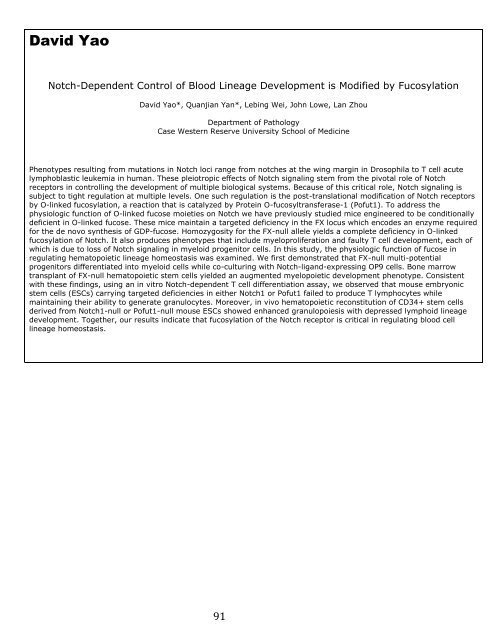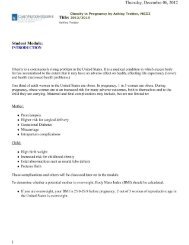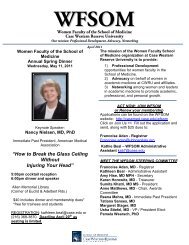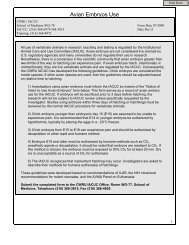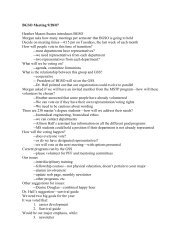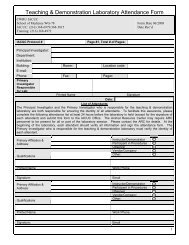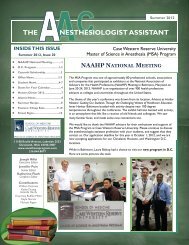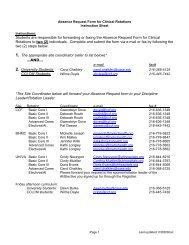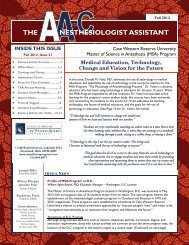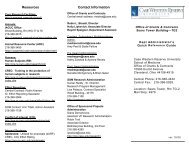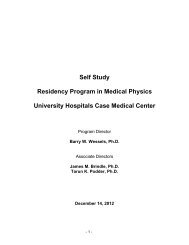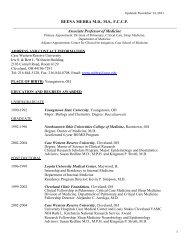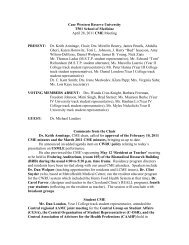student research day - Case Western Reserve University School of ...
student research day - Case Western Reserve University School of ...
student research day - Case Western Reserve University School of ...
You also want an ePaper? Increase the reach of your titles
YUMPU automatically turns print PDFs into web optimized ePapers that Google loves.
David Yao<br />
Notch-Dependent Control <strong>of</strong> Blood Lineage Development is Modified by Fucosylation<br />
David Yao*, Quanjian Yan*, Lebing Wei, John Lowe, Lan Zhou<br />
Department <strong>of</strong> Pathology<br />
<strong>Case</strong> <strong>Western</strong> <strong>Reserve</strong> <strong>University</strong> <strong>School</strong> <strong>of</strong> Medicine<br />
Phenotypes resulting from mutations in Notch loci range from notches at the wing margin in Drosophila to T cell acute<br />
lymphoblastic leukemia in human. These pleiotropic effects <strong>of</strong> Notch signaling stem from the pivotal role <strong>of</strong> Notch<br />
receptors in controlling the development <strong>of</strong> multiple biological systems. Because <strong>of</strong> this critical role, Notch signaling is<br />
subject to tight regulation at multiple levels. One such regulation is the post-translational modification <strong>of</strong> Notch receptors<br />
by O-linked fucosylation, a reaction that is catalyzed by Protein O-fucosyltransferase-1 (P<strong>of</strong>ut1). To address the<br />
physiologic function <strong>of</strong> O-linked fucose moieties on Notch we have previously studied mice engineered to be conditionally<br />
deficient in O-linked fucose. These mice maintain a targeted deficiency in the FX locus which encodes an enzyme required<br />
for the de novo synthesis <strong>of</strong> GDP-fucose. Homozygosity for the FX-null allele yields a complete deficiency in O-linked<br />
fucosylation <strong>of</strong> Notch. It also produces phenotypes that include myeloproliferation and faulty T cell development, each <strong>of</strong><br />
which is due to loss <strong>of</strong> Notch signaling in myeloid progenitor cells. In this study, the physiologic function <strong>of</strong> fucose in<br />
regulating hematopoietic lineage homeostasis was examined. We first demonstrated that FX-null multi-potential<br />
progenitors differentiated into myeloid cells while co-culturing with Notch-ligand-expressing OP9 cells. Bone marrow<br />
transplant <strong>of</strong> FX-null hematopoietic stem cells yielded an augmented myelopoietic development phenotype. Consistent<br />
with these findings, using an in vitro Notch-dependent T cell differentiation assay, we observed that mouse embryonic<br />
stem cells (ESCs) carrying targeted deficiencies in either Notch1 or P<strong>of</strong>ut1 failed to produce T lymphocytes while<br />
maintaining their ability to generate granulocytes. Moreover, in vivo hematopoietic reconstitution <strong>of</strong> CD34+ stem cells<br />
derived from Notch1-null or P<strong>of</strong>ut1-null mouse ESCs showed enhanced granulopoiesis with depressed lymphoid lineage<br />
development. Together, our results indicate that fucosylation <strong>of</strong> the Notch receptor is critical in regulating blood cell<br />
lineage homeostasis.<br />
91


